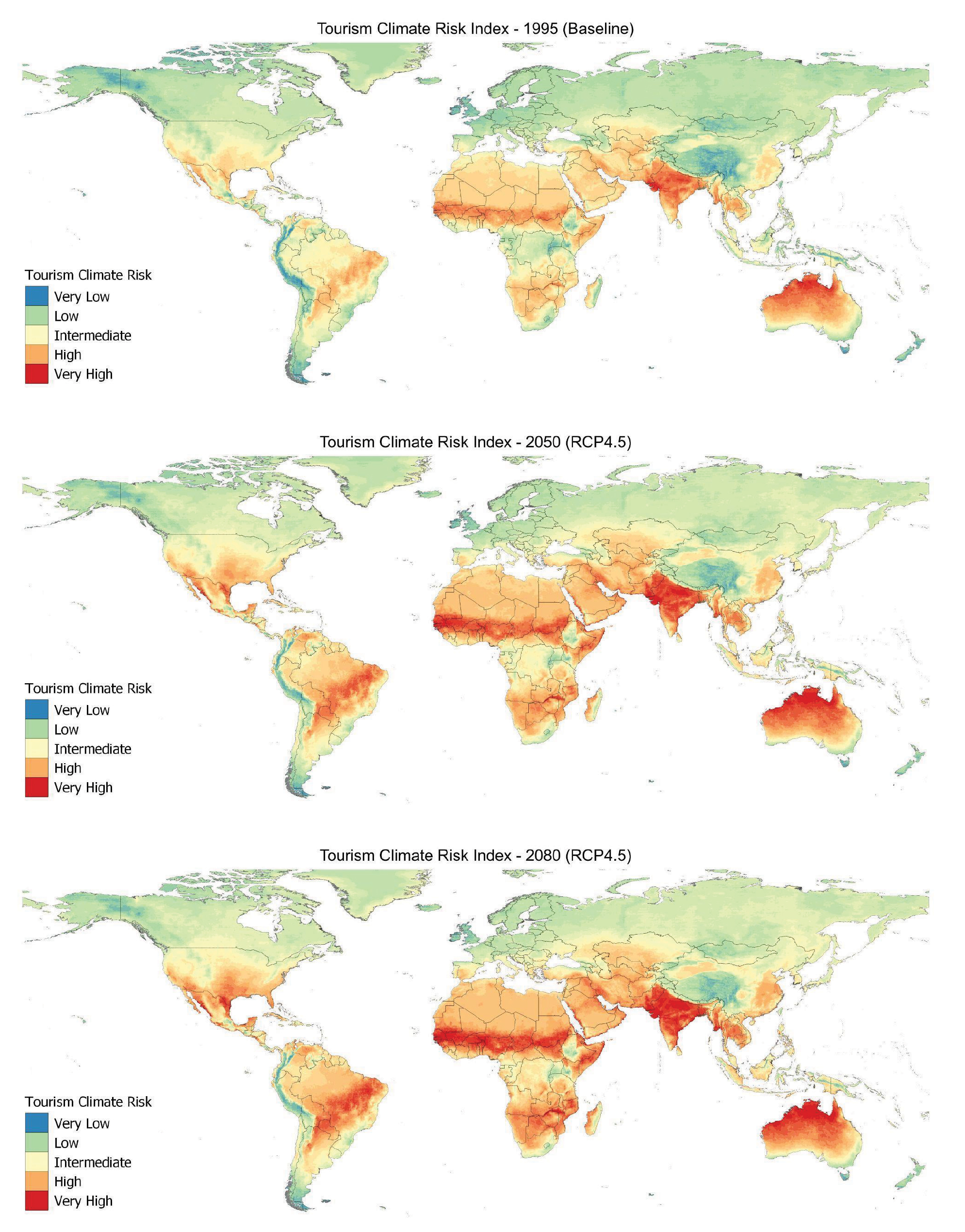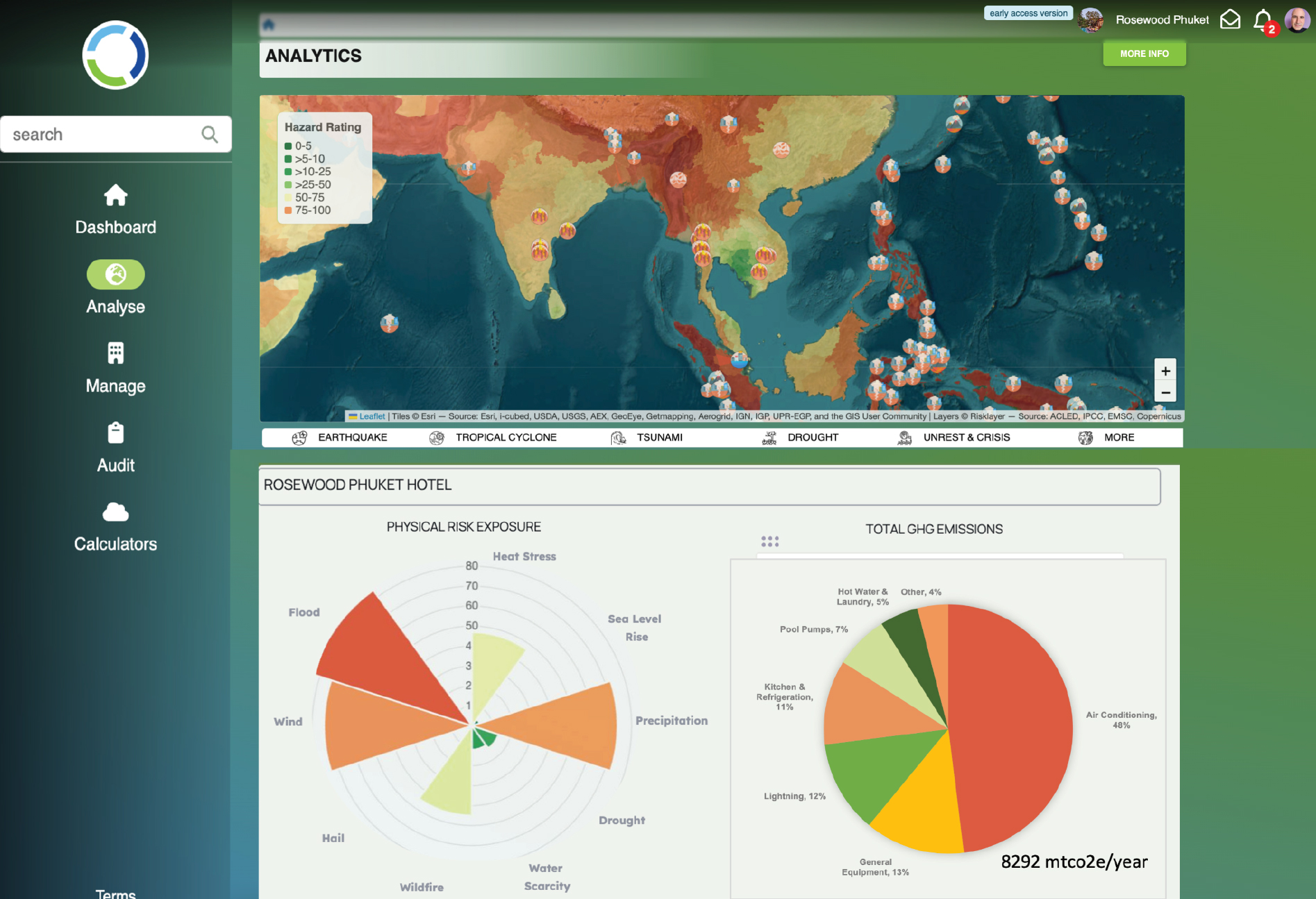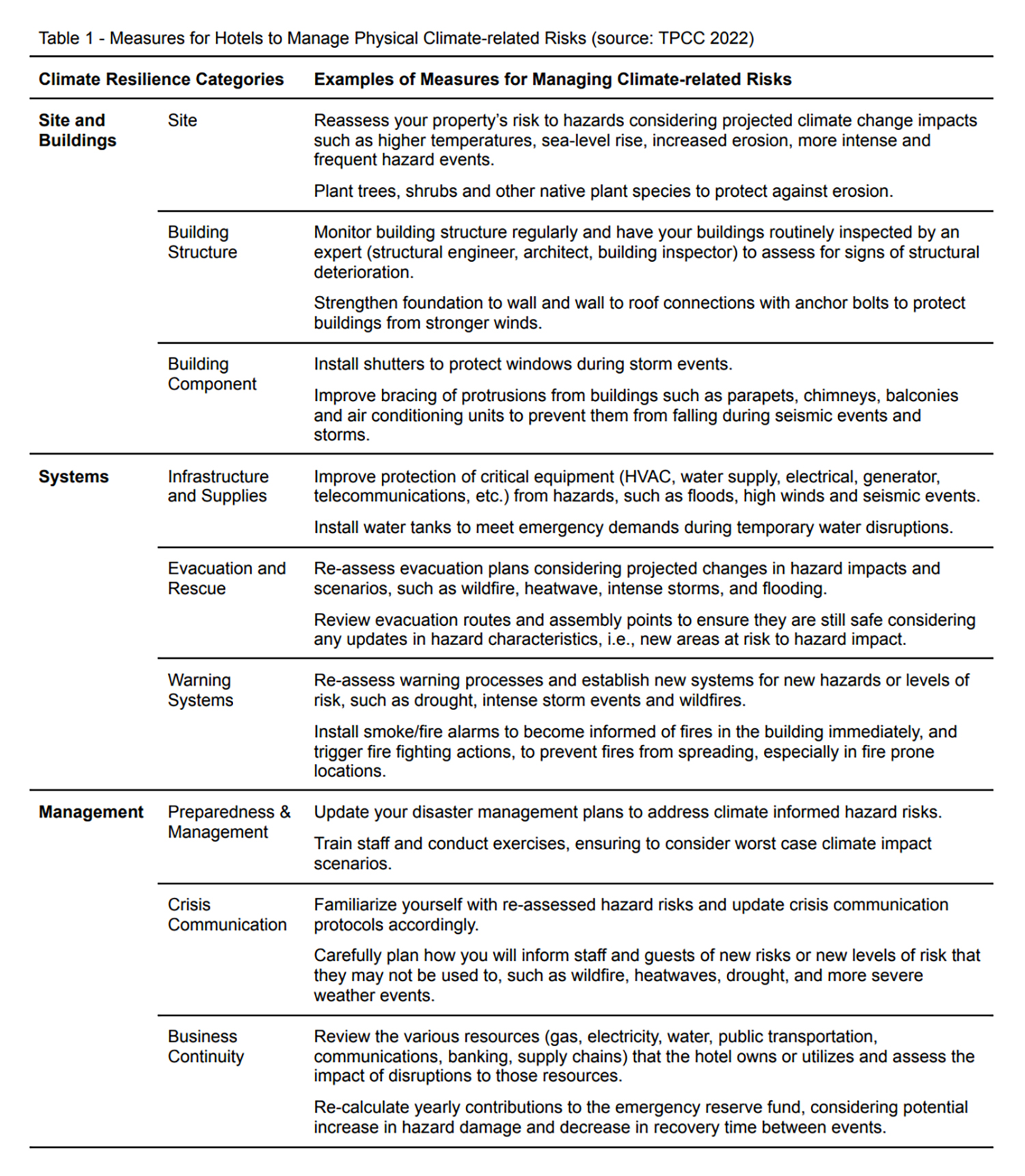Tourism in a Changing Climate: Navigating the Future through a Resilience Lens


Synopsis
The Tourism Panel on Climate Change's 2022 report, “The Imperative for Advancing Climate Risk Assessment in Tourism,” underscores the urgent need for the tourism industry, especially hotels, to address climate change risks. It details measures based on the Hotel Resilient Climate and Crisis Resilience Standards to enhance climate resilience. However, the implementation of these measures is often hindered by the hotel management's perception of risk and rigid organizational structures. The report emphasizes the necessity for a paradigm shift in hotel management, recognizing climate resilience as crucial for the sector's long-term sustainability and competitiveness. It highlights that the tourism industry, facing diverse challenges from climate change, must adopt a comprehensive and proactive approach for resilience and sustainability.
The Tourism Panel on Climate Change’s "Tourism Climate Change Stocktake 2023" report presented at COP28 provides an in-depth analysis of the reciprocal impact between tourism and climate change, underscoring the need for more robust efforts in policy integration, emissions mitigation, and capacity building to align the tourism sector with global climate objectives. Key findings reveal that tourism growth is not aligned with climate goals, primarily due to increased air travel. Tourism policies lack integration with climate frameworks, and national policies often overlook climate change. The sector faces significant challenges in reducing emissions, with current practices not effectively curbing high-emission tourism forms. Climate change poses extensive impacts on tourism, especially in regions crucial for economic growth. Government investments in tourism infrastructure often exacerbate GHG emissions, and there is a substantial gap in climate change training and awareness within the industry. Although hotel operations have seen some improvement in GHG intensity, these are negated by increased room numbers, with emission reductions mainly from electricity decarbonization rather than reduced consumption.
The Intergovernmental Panel on Climate Change's Sixth Assessment Report highlights the disruptions in the global climate system and underscores their implications for the tourism sector. The industry is grappling with climate change impacts such as an increase in heatwaves, droughts, wildfires, and ecosystem transformations, which are reshaping investment, planning, operations, and customer demand. Despite the growing frequency of crises, many tourism destinations remain underprepared, with insufficient updates to their crisis management plans.
Climate change impacts on tourism
Climate change impacts are interconnected, with one impact triggering or amplifying others. Severe storms, for example, increase the risk of infrastructure damage, while the loss of coral reefs can lead to coastal erosion. Climate change effects are also nonlinear, meaning small changes can lead to significant consequences, including potential "tipping points" with irreversible impacts. These challenges require businesses to adopt a holistic approach and consider various local, regional, and global climate impacts.
The following represent key climate change impacts on the tourism industry:
- Rising Sea Levels: Coastal tourism is severely impacted as sea-level rise erodes infrastructure, submerges beaches, and damages natural attractions, reducing quality and subsequently demand.
- Rising Temperatures: Increased temperatures make some locations too hot for summer tourism, affect winter sports destinations, and disrupt biodiversity and eco-tourism. Shifts in tourism demand and seasonality are expected.
- Increased Severity and Frequency of Weather Events: Heatwaves, wildfires, heavy precipitation, floods, and tropical cyclones are becoming more severe, particularly affecting small island developing states. These events can deter potential tourists and disrupt infrastructure. The increased frequency of such events also reduces the time available between events to recover from impacts.
- Water Scarcity: Climate-induced water scarcity leads to conflicts with local communities and increased operating costs for tourism. Droughts have resulted in reduced tourist arrivals in some areas.
- Habitat Destruction: Sea-level rise, inundation, and drought destroy habitats, reducing destination attractiveness. Coral reefs, vital for tourism, are particularly vulnerable to climate change.
- Reduced Beach Availability: Sea-level rise, coastal erosion, and extreme events can reduce beach size, impacting coastal tourism destinations significantly.
- Risks to Return on Investment and Insurability: Widespread damage and financial losses reduce the return on investment for tourism businesses. Insurers are reassessing risks, potentially making coverage less accessible, particularly for smaller businesses.
- Increased Risk Perception: tourists may alter their preferences, avoiding destinations that are more likely to experience drought, storms, wildfires, and extreme heat due to a heightened perception of risk.
Measuring climate change risk
Assessing and measuring climate change risks is crucial for hotel owners and other tourism businesses. Firstly, climate change poses significant threats to the physical infrastructure that tourism relies upon, particularly in regions prone to extreme weather events like hurricanes, floods, or wildfires. By understanding these risks, tourism stakeholders can implement necessary adaptations and reinforcements to their properties and assets. Secondly, climate change impacts can lead to operational disruptions and financial losses. For instance, a rise in sea levels or increased frequency of natural disasters can deter tourists, directly affecting the tourism demand. Thirdly, being proactive in assessing climate risks positions tourism businesses as responsible and forward-thinking. This not only enhances reputation but also aligns with increasing consumer and investor demand for environmentally conscious travel options. Moreover, tourism businesses that are prepared for climate-related challenges are likely to see reduced insurance premiums and better compliance with evolving environmental regulations. Lastly, understanding and mitigating climate risks is essential for the long-term sustainability and viability of the hotel industry, as it navigates an increasingly unpredictable environmental landscape.
Climate risk modeling
Climate risk modeling in the tourism industry is a method for assessing the potential impacts of climate change on tourism-related assets, destinations, and operations. This approach is becoming increasingly important due to the evident and growing impact of climate change on the tourism sector, including heatwaves, drought, wildfires, and changes in landscapes and ecosystems. Climate risk modeling is increasingly vital for decision-making in the tourism sector amidst a changing climate. This approach is essential for enhancing resilience, enabling the development of climate transition and resilience strategies tailored to the hospitality industry. Utilizing advanced climate science, climate risk modeling provides specific quantification of climate risks and projects future climate scenarios.

Figure 1 highlights how the global distribution of tourism's exposure to a combined 9 climate hazards varies under a moderate (RCP4.5) emissions scenario. The areas most at risk, or exposure hotspots, include south and southeastern Asia, sub-Saharan Africa, the Amazon and central South America, small island developing states in the Caribbean, and the Indian and Pacific oceans, as well as northern Australia, and the southern regions of the USA and Mexico. In contrast, the regions with the lowest exposure to these hazards are found in western and northern Europe, central Asia, and specific areas of China, Canada, and New Zealand. The high exposure in areas where tourism is a significant economic contributor or is seen as a key development strategy highlights the potential of climate change to impede tourism's role in achieving the Sustainable Development Goals (SDGs). This underscores the necessity for countries to integrate tourism considerations into their National Adaptation Plans. Source: Risklayer 2023 published in TPCC 2023
Hotel Resilient integrates climate risk analytics which can be utilized by a range of stakeholders within the tourism and hospitality industry, including hospitality companies, destination management organizations, investors, and others. This integration empowers informed climate risk assessments and decision-making within the industry, offering the following capabilities to hospitality companies:
- Personalized asset portfolio creation for collaboration across organizations.
- Identification of vulnerabilities and opportunities across diverse climate scenarios.
- Integration of climate data into decision-making processes for adaptation planning, business continuity, and climate-related financial disclosure compliance.
- Climate risk ratings for large portfolios, aiding decision-making, benchmarking, and financial impact evaluation under climate stress scenarios.
This integrated approach helps users track and quantify climate risk across their portfolio, considering acute and chronic hazards such as heat stress, precipitation, flooding, wind, drought, and wildfire. Users can assess risk across different timeframes and scenarios, with asset risk ratings from 'Very Low' to 'Extremely High. Hotel Resilient also simplifies financial disclosure reporting in line with Task Force on Climate-related Financial Disclosures (TCFD) guidelines. Users can customize, share, and download these reports to efficiently fulfill disclosure requirements.

From assessment to action
Climate change is already affecting tourism destinations and businesses, posing a significant threat to their viability and demanding that action be taken immediately to address climate risks. The Tourism Panel on Climate Change’s (TPCC) 2022 report “The Imperative for Advancing Climate Risk Assessment in Tourism” highlights various measures that hotels can implement to address climate change, based on the Hotel Resilient Climate and Crisis Resilience Standards. Implementing such measures is greatly influenced, and often restricted, by a hotel owner or manager’s perception of risk, as well as the hotel’s organizational structure, which can be difficult to change. For many, the successful adaptation of these measures will require a shift in mindset at all levels of hotel management, acknowledging that climate resilience is essential for the long-term sustainability and competitiveness of the tourism sector.

Conclusion
The tourism industry faces multifaceted challenges from climate change, affecting destinations, hotels and tourism businesses worldwide. Addressing these challenges requires a comprehensive and proactive approach to ensure the sector's long-term resilience and sustainability. Understanding the unique characteristics of hazards (heatwaves, droughts, wildfires, extreme weather events) and how they will be altered by climate change over time is key to developing detailed models for future research.
Hotel Resilient integrates climate risk analytics which can be utilized by a range of stakeholders within the tourism and hospitality industry, including hospitality companies, destination management organizations, investors, and others. This integration empowers informed climate risk assessments and decision-making within the industry, offering the following capabilities to hospitality companies:
- Personalized asset portfolio creation for collaboration across organizations.
- Identification of vulnerabilities and opportunities across diverse climate scenarios.
- Integration of climate data into decision-making processes for adaptation planning, business continuity, and climate-related financial disclosure compliance.
- Climate risk ratings for large portfolios, aiding decision-making, benchmarking, and financial impact evaluation under climate stress scenarios.
This integrated approach helps users track and quantify climate risk across their portfolio, considering acute and chronic hazards such as heat stress, precipitation, flooding, wind, drought, and wildfire. Users can assess risk across different timeframes and scenarios, with asset risk ratings from 'Very Low' to 'Extremely High. Hotel Resilient also simplifies financial disclosure reporting in line with Task Force on Climate-related Financial Disclosures (TCFD) guidelines. Users can customize, share, and download these reports to efficiently fulfill disclosure requirements.